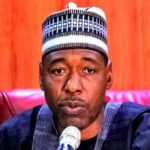DEAR incoming president, since 1999, successive administrations have failed to provide affordable uninterrupted electricity supply for Nigerians. This has kept the cost of manufacturing high, and Nigeria remains a consuming, rather than a producing, nation. Several reports recorded between $2.88 billion and $16 billion as the amount spent on power project by President Olusegun Obasanjo’s administration between 1999 and 2007. The conflicting amount would have been immaterial if the power projects have yielded visible results. In 2007, President Yar’Adua, took on the responsibilities of the energy ministry and appointed three junior ministers to support him in the role. Ajumogobia was named junior minister for petroleum, Fatimah Ibrahim for power, and Odusina Emmanuel for gas. Unfortunately,the Chemist-turned politician died of illness at a hospital in Saudi Arabiain 2010, and his team could not achieve much despite spending about $2.63 billion within three years. Yar’Adua’s immediate successor – President Jonathan reportedly spent about $1.36 billion between 2011 and 2015, and was only able to complete the privatization of generation (Genco) and distribution (Disco). The privatization has been seen to be controversial because the new owners of the defunct Power Holding Company of Nigeria (PHCN) have no capacity. Between 2015 and 2019, President Muhammadu Buhari’s administration has also reportedly spent $2.95 billion without any result so far.
One good thing about Yar’Adua’s approach is the merging of petroleum and power ministries, even though the subsections were improperly categorised and manned by politicians who were not energy professionals. Separating petroleum and power into different ministries is a structural issue against the turnkey ideal of energy development. Petroleum is an energy source. Electricity is an energy vector. Both are elements of energy that should be administered together under a ministry of energy. This will enable necessary synergies within the value chains of the energy sector. It is the global best practice. The ChannelsTV interview of President Buhari has shown that his administration might also fail to significantly improve electricity supply in Nigeria, just like his predecessors. Buhari was asked a question about electricity supply, but responded with his successes on the road and rail infrastructures. He did not reference the Siemen’s Electricity Project.
Siemens, contracted by Buhari’s administration with an understanding with the immediate past German Chancellor Angela Merkel, had proposed to raise Nigerian electricity supply to 25,000 MW by the year 2025. The detail of the proposal is contained in the 68-page White Paper titled “Electrification Roadmap for Nigeria ‘’, the final version of which was dated November 14, 2018. The project timeline with various expected milestones to address generation, transmission and distribution, were clearly stated on page 22 of the White Paper. It is disheartening to observe that 38 months later, nothing tangible has been done. This is a clear indication that 25,000 MW by the year 2025 is a mirage, except something drastic is done. As the in-coming Nigerian President, my unsolicited and patriotic advice to you is to review the Siemens proposal to provide 25,000MW electricity within two to three years of your administration, to begin to power the Nigerian economy at an affordable and subsidised tariff. This is among other things that should be done to get the country on the path of industrialization, and to establish medium- and long-term directions for Nigeria to be a player in the global energy transition market.
To do so, Mr. In-coming Nigerian President, you should appoint an energy professional as the Minister of Energy. Someone who has technical knowledge and awareness of latest energy development technologies, and will roll up his or her sleeves to lead the process of conquering all obstacles for the greater good of Nigerians. Nigeria, at this stage of global energy transition, cannot afford an administrator, with only a second-hand knowledge of technical requirements, to lead her energy sector. For many years, politicians, mostly lawyers, have dominated leadership of the Nigerian energy sectors, at the federal cabinet, and they have failed woefully. A few who have energy-related backgrounds were not supported with strong presidential political will. The Minister of Energy should be supported by three Director Generals or Permanent Secretaries. Each for: (1) Fossil & Related Fuel Technologies (Coal, Oil and Natural Gas, Blue Hydrogen, Biomethane, Carbon Capture Utilization and Storage, and associate research and development, etc.); (2) Non-Fossil Energy Resources (Solar, Onshore Wind, Offshore Wind, Nuclear, Green Hydrogen, and associated research and development, etc.); and (3) Power Generation, Transmission and Distribution (electric vehicles charging stations development, micro-grid and grid resilient technologies, among others).Coal should be taken away from the Ministry of Solid Minerals. Coal should be seen, first, as a fossil fuel, and be considered as part of the energy mix for electricity generation, and when economical, used with the Carbon Capture Utilization and Storage (CCUS) technologies. The CCUS technological development is growing globally.
Government investment in petroleum resources should be limited to the upstream sub-sector, especially now that NNPC is a limited liability company. The moribund petroleum refineries should be sold to private investors who will revamp and put them to better use. Associated labor matter should be resolved with the new owners. The proceeds of sale should be invested in electricity generation, transmission and distribution, and in clean energy development. Nigerian vast natural gas reserves, estimated at 187 trillion cubic feet, should be leveraged for significant global share in the energy transition, especially in blue hydrogen production. The Kingdom of Saudi Arabia, for instance, is now exporting natural gas to blue hydrogen producers and fuel-cell electric auto-makers in Asia, and receiving back the captured CO2 for enhanced oil recovery. The international oil companies (e.g., BP, Shell, Total Energies) are now operating as energy companies, investing in blue and green hydrogen, solar and wind energy to generate and sell electricity. Many of them now have battery -charging stations to serve owners of electric vehicles, especially in Europe and North America. Most oil producing nations and international oil companies are now diversifying, utilizing revenues from oil and gas for investment in clean energy resources.
Nigeria must do proper estimation of her various energy resources, especially the clean energy potentials, and seek collaborations the international energy companies,operating in Nigerian petroleum industry for the past 6 decades, to develop these resources. The Minister of Energy and the supporting Directors must work together as an agile team to maximize Nigeria’s potential in the energy transition market. You must give the energy team highest attention, supporting them with necessary political-will to achieve needed progress. You should strive to meet this team as frequently as possible for briefings.
Any bureaucratic bottleneck, outdated laws, and court cases that will create a cog in the wheel of progress must be quickly identified and speedily handled by the President and the Attorney General
If and when necessary, past actions, laws and regulations seen as obstacles must be set aside by executive order for the greater good. For instance, Buhari recently blamed the poorly executed privatization of distribution as responsible for his administration’s failure in providing electricity. Such an excuse is untenable in an emergency situation, which the Nigerian energy sector should be considered. Buhari failed to tell Nigerians any executive actions by his administration to address the situation. A poorly executed process by a previous administration should be addressed by all means possible, by a determined current President. That is the duty of such a president.
Mr. In-coming Nigerian President, Nigeria has great potential to be a leader in the imminent global energy transition. But she has to first conquer her inability to provide affordable and constant electricity supply to power her micro- and macro- economics. No country can develop without affordable and constant electricity supply. For instance, commercial agriculture with complete value chains (e.g., from Cocoa farming to Chocolate production) can only be possible with affordable and constant supply of electricity. Just because Nigeria is underutilizing her arable lands, according to President Buhari, does not mean Nigeria can increase agricultural outputs significantlywith attendant value chains; without adequate provision for electricity to convert raw farm-produce to market ready products.
The global energy transition to abateclimate change is imminent. Therefore, while providing immediate energy needs, especially electricity from energy mix; a certain percentage of oil and gas revenues should be invested in the medium- and long-term development, and capacity-building, of clean energy resources. Collaborations should be sought with international oil and energy companies.Private sectors should be involved in the entire energy value chains, especially electricity transmission. Unborn generation of Nigerians will forever be grateful to you, if you can provide 25,000 MW of uninterrupted electricity, and lay a foundation for clean energy transition.
Set up ateam and let them begin to review various approaches and plans now.Make it part of your electioneering campaign activities, such that implementation can start immediately, upon your assumption of duties on May 29 2023.
Mr. In-coming Nigerian President, please kindly accept the assurances of my highest esteem.
- Salako, Ph.D, writes in from North Dakota, United States,via Olarinre.salako@gmail.com






